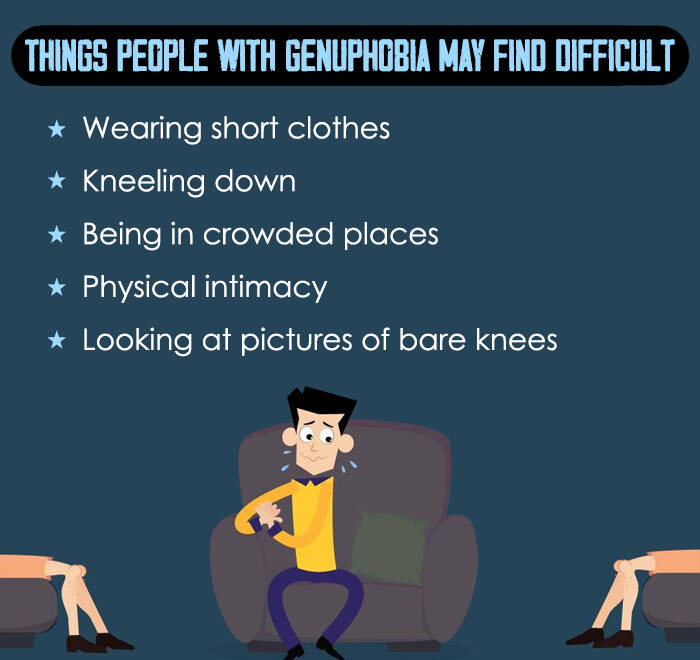Genuphobia is an intense, irrational fear of knees or the act of kneeling. Although quite uncommon, people with this condition may experience high levels of anxiety simply thinking of knees or the idea of kneeling.
What Is Genuphobia?
The term genuphobia is derived from the Latin word ‘genu’, meaning knees, and the Greek word ‘phobos’ meaning fear or aversion. Someone suffering from this phobia can be scared of knees, kneeling, or getting knee injuries.
The intensity and nature of this phobia vary greatly as one person may be afraid of bare knees in person, while someone else may be scared of images and videos of uncovered knees.
Sometimes, people may even be scared of their own knees. People with this condition stress over keeping their knees covered most of the time. They may even be unable to participate in certain activities, like swimming or other sports, and religious practices or occupations that require kneeling down frequently.
Experiencing a knee injury 1 Gage, B. E., McIlvain, N. M., Collins, C. L., Fields, S. K., & Comstock, R. D. (2012). Epidemiology of 6.6 million knee injuries presenting to United States emergency departments from 1999 through 2008. Academic emergency medicine : official journal of the Society for Academic Emergency Medicine, 19(4), 378–385. https://doi.org/10.1111/j.1553-2712.2012.01315.x is perhaps the most common reason for developing this rare phobia. However, there may be various other reasons for the occurrence of this condition.
Read More About Phobia Here
Case Example
17-year-old Vrisha never liked wearing shorts, ripped jeans, dresses, or skirts that revealed her knees. Even looking at other people’s knees or pictures of their knees would make her extremely uncomfortable.
Not only was the sight of knees repulsive to her but she also disliked feeling knees (even if they were her own knees) touching each other or brushing a surface (like while kneeling). One day, as she was traveling by a bus, her knee accidentally brushed against someone else’s.
This triggered an extreme reaction in Vrisha. She experienced palpitations, trembling, and dizziness—symptoms which soon culminated in a full-blown panic attack.
Since then, traveling by public transportation and going to crowded places scared her. She also developed an obsessive need to keep her knees from touching things.
She even desperately avoided looking at bare knees, whether her own or of others. This made it extremely difficult for her to function well in everyday life.
Case Analysis
Vrisha was evidently suffering from an intensely debilitating fear of knees called genuphobia. Its symptoms—comprising an extreme fear of seeing, touching, and feeling knees—were causing extreme distress and impairment in her daily functioning.
Symptoms Of Genuphobia
Genuphobes may experience intense panic attacks when exposed to uncovered knees or forced to kneel down, showing symptoms such as
Physical symptoms
- Increased heart rate
- Increased rate of breathing
- High blood pressure
- Muscle tension
- Trembling
- Excessive sweating
- Shaking or trembling
- Dizziness or fainting
- Rapid speech or inability to speak
- Hot and cold flashes
Although panic attacks are not a common symptom of genuphobia, they can occur if the intensity of the phobia is severe. Apart from panic attacks, there are several other psychological symptoms of Genuphobia, which are mentioned below.
Psychological symptoms
- Fear of death or thoughts of dying
- Feeling a sense of losing reality
- Having a sense of detachment
- Fear of losing control and embarrassing oneself
- Feeling like fainting and nausea
- Excessive anxiety
- Constantly avoiding knees
In children and adolescents, Genuphobia symptoms may manifest as.
- Loss of self-esteem
- Poor friendships and relationships
- Failure to reach academic potential
Causes Of Genuphobia
Most of the time, Genuphobia is caused by a negative experience, like a knee injury, either to the sufferer or to someone close to them. However, there are various other genetic, environmental 2 Loken, E. K., Hettema, J. M., Aggen, S. H., & Kendler, K. S. (2014). The structure of genetic and environmental risk factors for fears and phobias. Psychological medicine, 44(11), 2375–2384. https://doi.org/10.1017/S0033291713003012 , psychological, and cultural risk factors for genuphobia
Some potential genuphobia causes are discussed below.
1. Genetic factors
Studies reported that specific phobias tend to run in families. Approximately two-thirds to three-fourths of affected individuals have at least one first-degree relative with a specific phobia of the same type.
Hence, some individuals are simply more prone to developing psychological problems. For instance, if someone has a family history of genuphobia then they are more likely to develop that condition.
2. Environmental factors
Suppose a person severely injured their knees as a child or saw someone else get a knee injury, either in person or in the media. In that case, they may also develop this particular phobia. Even a single negative experience can create a significant impact and cause the phobia to develop.
3. Psychological factors
Children can often develop certain phobias if their parents suffer from severe anxiety. If a parent is too strict and asks their children to keep their knees covered or protected at all times, then the child may become sensitive towards their knees and develop a fear of injury. Moreover, people with body dysmorphic disorder 3 Bjornsson, A. S., Didie, E. R., & Phillips, K. A. (2010). Body dysmorphic disorder. Dialogues in clinical neuroscience, 12(2), 221–232. https://doi.org/10.31887/DCNS.2010.12.2/abjornsson may believe that their knees are out of shape and may be prone to genuphobia.
Moreover, if someone was frequently punished as a child and had to kneel repeatedly, then they might also have a fear of knees. For them, knees could be a symbol of servitude, submission, abuse, and anxiety.
4. Cultural factors
In some cases, cultural factors 4 Hofmann, S. G., Anu Asnaani, M. A., & Hinton, D. E. (2010). Cultural aspects in social anxiety and social anxiety disorder. Depression and anxiety, 27(12), 1117–1127. https://doi.org/10.1002/da.20759 are accountable for the fear of knees. Exposing knees may be unacceptable in some cultures, especially when it comes to women. Hence, they might develop negative thoughts and beliefs associated with knees as they are usually unfamiliar with bare knees. This might develop into genuphobia.
Diagnosis Of Genuphobia
According to the Diagnostic and Statistical Manual of Mental Disorders (DSM) 5, genuphobia can be diagnosed as a specific phobia 5 Samra, C. K., & Abdijadid, S. (2022). Specific Phobia. In StatPearls. StatPearls Publishing. Available from: https://www.ncbi.nlm.nih.gov/books/NBK499923/ , although it is much rarer than most other phobias.
A genuphobia diagnosis can be made by a mental health professional, such as a psychologist or a psychiatrist, after careful evaluation of the symptoms and detailed intake history.
There are no specific tests for the diagnosis of genuphobia. However, psychometric tests such as the Behavioral Approach Test (BAT 6 Antony, M. M. (2021). Specific Phobia: A Brief Overview and Guide to Assessment. Practitioner’s Guide to Empirically Based Measures of Anxiety, 127–132. https://doi.org/10.1007/0-306-47628-2_11 ) may be used to aid the diagnosis.
Complications Of Genuphobia
Genuphobia can present several complications in a person’s day-to-day life.
- As people with genuphobia may be severely uncomfortable with someone looking at or touching their knees, it can affect their intimate relationships to a great extent.
- Situations that require one to kneel can also be very difficult to navigate for people who have a fear of kneeling.
- Sports and other professions that require one to wear short clothes would be inaccessible to people afraid of knees.

How to Overcome Genuphobia
Although there is no remedy specific to this disorder, some genuphobia treatment options may involve
1. Cognitive Behavioral Therapy
Cognitive behavioral therapy or CBT 7 Kaczkurkin, A. N., & Foa, E. B. (2015). Cognitive-behavioral therapy for anxiety disorders: an update on the empirical evidence. Dialogues in clinical neuroscience, 17(3), 337–346. https://doi.org/10.31887/DCNS.2015.17.3/akaczkurkin is a psycho-social intervention that helps to improve the patient’s mental and emotional well-being. It enables people to identify their own emotions and understand how they behave and react in regard to their phobia. Moreover, CBT also inspires genuphobic people to slowly get familiar with knees and kneeling in an acceptable and positive way.
Read More About CBT Here
2. Exposure Therapy
Exposure therapy 8 McGuire, J. F., Lewin, A. B., & Storch, E. A. (2014). Enhancing exposure therapy for anxiety disorders, obsessive-compulsive disorder and post-traumatic stress disorder. Expert review of neurotherapeutics, 14(8), 893–910. https://doi.org/10.1586/14737175.2014.934677 is highly effective and helpful when it comes to treating phobias. It helps to desensitize the patient to their specific fears by gradually exposing them to knees and the act of kneeling in a safe environment. By experiencing the triggers and anxiety in a controlled environment, genuphobes can learn to overcome feelings of distress when exposed to knees.
Apart from CBT and exposure therapy, hypnotherapy may also be used by some mental health professionals to treat this phobia.
3. Medication
There are no specific medications for this phobia. But certain medicines like antidepressants and anti-anxiety medicines can be prescribed for relieving the symptoms of genuphobia.
However, they may have side effects like sleepiness & weight gain. This is why it is crucial to seek professional help when trying to cope with anxiety disorders and phobias.
4. Self-help treatment
Apart from therapies and medications, some self-help techniques can also help in coping with genuphobia. Here are some effective ways to get started:
A. Journaling
By writing down negative thoughts and emotions, you can analyze and understand the intensity of your phobia. This is a great way to process negative thoughts and behaviors to adapt and change eventually.
B. Relaxation techniques
Breathing exercises, yoga, meditation 9 Krishnakumar, D., Hamblin, M. R., & Lakshmanan, S. (2015). Meditation and Yoga can Modulate Brain Mechanisms that affect Behavior and Anxiety-A Modern Scientific Perspective. Ancient science, 2(1), 13–19. https://doi.org/10.14259/as.v2i1.171 , tai chi, and other relaxation techniques can greatly help in boosting concentration and reduce anxiety. By developing a relaxed mind the patient can control their phobic reactions and decide how they want to behave when encountering triggers and stressors in a calmer way.
C. Physical exercise
Any kind of physical exercise 10 Stonerock, G. L., Hoffman, B. M., Smith, P. J., & Blumenthal, J. A. (2015). Exercise as Treatment for Anxiety: Systematic Review and Analysis. Annals of behavioral medicine : a publication of the Society of Behavioral Medicine, 49(4), 542–556. https://doi.org/10.1007/s12160-014-9685-9 like walking, swimming, running, cardio, weightlifting, or even dancing can help to reduce the symptoms associated with genuphobia. Moreover, by engaging in sports and physical activities the patient will get gradual exposure to knees and become more comfortable with uncovered knees and kneeling over time.
Takeaway
If your fear of knees or kneeling is affecting your daily life, then it is crucial that you visit a primary care physician or a mental health professional immediately. Undergoing therapy, taking medicines, and practicing the self-help techniques mentioned above can help you to not only overcome your phobia but also to live a healthier and more positive life.
At A Glance
- Genuphobia is a deep, irrational fear of knees or the act of kneeling.
- Genuphobic people often find their knees to be overwhelming and repulsive.
- Simply thinking about knees can trigger difficult emotions like worry, stress, and anxiety.
- Genuphobia is caused by a negative experience, like a knee injury, either to the sufferer or to someone close to them.
- There is no particular treatment for specific phobias like genuphobia.
- If your fear of knees or kneeling is affecting your daily life, then it is crucial that you visit a primary care physician or a mental health professional immediately.
Frequently Asked Questions (FAQs)
1. How rare is genuphobia?
Genuphobia is quite a rare condition, as evidenced by the lack of data on its prevalence.
2. Is genuphobia treatable?
Genuphobia, like most specific phobias are treatable with the help of therapy and self-help techniques.
3. Can genuphobia be cured?
There is no evidence that suggests that genuphobia can be completely cured, but availing therapy and healthy coping strategies can help a person manage his/her symptoms of genuphobia better.














